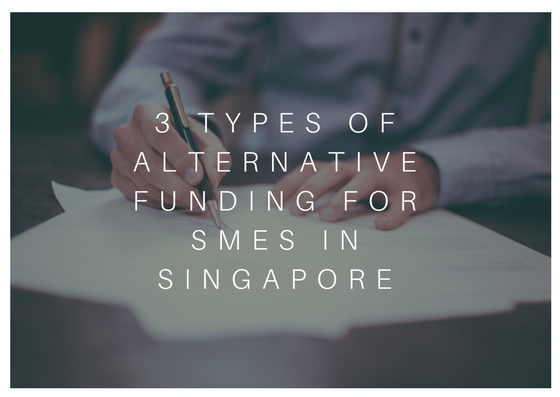
3 Types of Alternative Funding for SMEs in Singapore
Alternative Funding: Overview
Financing issues is one of the top 4 cost challenges faced by small and medium enterprises (SMEs). Higher interest rates for bank loans, suppliers tightening credit access and the need for more collateral are among the major reasons why SMEs are unable to achieve cost efficient financing. We will be looking into why financial institutions do not easily service SMEs, and 3 other types of alternative funding options that can help SMEs in Singapore.

Financial Institutions
Only 6 in 10 SMEs in Singapore are financed by bank loans and facilities. The remaining 4 in 10 do not have banking support.
SMEs are not very established, and may not have a stable outlook yet. As a result, financial institutions are less willing to lend to SMEs and support small business lending because of their lower risk appetite.
Ooi Huey Tyng, Visa country manager for Singapore and Brunei, said the lack of SME cash-flow visibility and credit information increases the cost of credit risk assessment. This makes it less rational for financial institutions to service certain segments of the SME market. Therefore, financial institutions are placing more emphasis on collateral requirements when assessing SME credit risk. However, SMEs are often not able to supply such collateral, leading to the rejection of their loan applications.
Alternative Funding for SMEs
The lack of access to affordable funding can trap SMEs in a “downward spiral”. The phrase implies that SMEs are unable to grow without more funds, but they cannot get funds without more growth.
SMEs can turn to various alternative funding options when they are unable to secure financing from banks. Here are 3 sources of alternative funding SMEs can use to raise funds without turning to financial institutions:
Government Schemes and Grants
The Singapore government has launched a series of financial schemes to support SMEs to aid with their finances, and provide support to start-ups:
- SME Micro Loans
- SME Equipment and Factory Loan
- SME Working Capital Loan
- SME Venture Loan
- Action Community for Entrepreneurship (ACE) Start-ups grant
- Technology Enterprise Commercialisation Scheme
Invoice Financing
Invoice Financing, also known as invoice trading, is a short-term alternative funding solution which allows firms to draw down cash against outstanding invoices due from customers. Firms pay a percentage of the invoice amount to the lender as borrowing fee, and can access 70% to 90% of their financing upfront.
Invoice financing can solve problems associated with overdue payments by customers and difficulties obtaining other types of business credit. In addition, this source of alternative funding can help businesses improve their cash flow.
Crowdfunding
Crowdfunding is a form of crowdsourcing and alternative financing, pooling small amounts of capital from many individuals to fund a project or business venture. Entrepreneurs can pitch their business ideas on the crowdfunding forums or platforms, and investors will then chip in a small amount into ideas which spiked their interest.
Related Article
Related Articles

How Invoice Finance Facilities Can Grow With Your Business

Knowing When It’s a Good Time to Get Invoice Finance Facility
